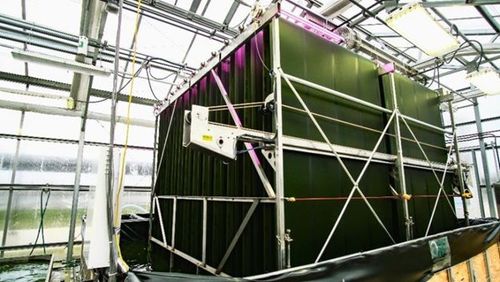New research illuminates more efficient phosphorus-consuming algae for wastewater treatment

A Revolving Algal Biofilm system by Gross-Wen Technologies at the Terrence J. O’Brien Water Reclamation Plant in Skokie, Illinois. / SOURCE: Gross-Wen Technologies.
December 27, 2023
BY U.S. Department of Energy
Phosphorus in wastewater is a major contributor to harmful algal blooms in water bodies around the globe, with the potential to harm wildlife, livestock, and even humans. Wastewater treatment plants often rely on chemical- and energy-intensive techniques to remove phosphorus before it can travel downstream.
In research supported by the U.S. Department of Energy Bioenergy Technologies Office (BETO), a team of scientists from the National Renewable Energy Laboratory (NREL), Gross-Wen Technologies, and the Metropolitan Water Reclamation District of Greater Chicago examined the unique properties of phosphorus uptake in the algal strains living in the Revolving Algal Biofilm (RAB) systems.
The RAB system by Gross-Wen Technologies is an emerging technology that leverages the natural ability of algae to harness solar energy to efficiently accumulate and remove phosphorus from water. The grown algal biomass can then be harvested from the belt and dried for use as agricultural fertilizer or as feedstock for the manufacture of biofuels and bioproducts.
In the new study published in the Frontiers in Microbiology journal, the researchers discovered that specific algal species outperform the broader population of algae in the system. These findings may offer insight to improve RAB performance while enhancing revenue streams for crop fertilizers or bioenergy feedstocks.
Advertisement
Advertisement
Learn more about this BETO-funded research and its potential implications for recovering harmful or valuable metals from wastewater.
Advertisement
Advertisement
Related Stories
The U.S. EPA on July 8 hosted virtual public hearing to gather input on the agency’s recently released proposed rule to set 2026 and 2027 RFS RVOs. Members of the biofuel industry were among those to offer testimony during the event.
The USDA’s Risk Management Agency is implementing multiple changes to the Camelina pilot insurance program for the 2026 and succeeding crop years. The changes will expand coverage options and provide greater flexibility for producers.
The USDA’s National Agricultural Statistics Service on June 30 released its annual Acreage report, estimating that 83.4 million acres of soybeans have been planted in the U.S. this year, down 4% when compared to 2024.
SAF Magazine and the Commercial Aviation Alternative Fuels Initiative announced the preliminary agenda for the North American SAF Conference and Expo, being held Sept. 22-24 at the Minneapolis Convention Center in Minneapolis, Minnesota.
Scientists at ORNL have developed a first-ever method of detecting ribonucleic acid, or RNA, inside plant cells using a technique that results in a visible fluorescent signal. The technology could help develop hardier bioenergy and food crops.
Upcoming Events










